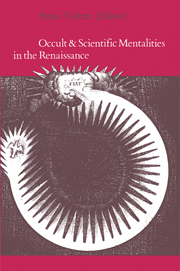Book contents
- Frontmatter
- Contents
- List of contributors
- Editor's preface
- Introduction
- 1 At the crossroads of magic and science: John Dee's Archemastrie
- 2 The occult tradition in the English universities of the Renaissance: a reassessment
- 3 Analogy versus identity: the rejection of occult symbolism, 1580–1680
- 4 Marin Mersenne: Renaissance naturalism and Renaissance magic
- 5 Nature, art, and psyche: Jung, Pauli, and the Kepler–Fludd polemic
- 6 The interpretation of natural signs: Cardano's De subtilitate versus Scaliger's Exercitationes
- 7 Kepler's attitude toward astrology and mysticism
- 8 Kepler's rejection of numerology
- 9 Francis Bacon's biological ideas: a new manuscript source
- 10 Newton and alchemy
- 11 Witchcraft and popular mentality in Lorraine, 1580–1630
- 12 The scientific status of demonology
- 13 “Reason,” “right reason,” and “revelation” in midseventeenth-century England
- Index
11 - Witchcraft and popular mentality in Lorraine, 1580–1630
Published online by Cambridge University Press: 12 January 2010
- Frontmatter
- Contents
- List of contributors
- Editor's preface
- Introduction
- 1 At the crossroads of magic and science: John Dee's Archemastrie
- 2 The occult tradition in the English universities of the Renaissance: a reassessment
- 3 Analogy versus identity: the rejection of occult symbolism, 1580–1680
- 4 Marin Mersenne: Renaissance naturalism and Renaissance magic
- 5 Nature, art, and psyche: Jung, Pauli, and the Kepler–Fludd polemic
- 6 The interpretation of natural signs: Cardano's De subtilitate versus Scaliger's Exercitationes
- 7 Kepler's attitude toward astrology and mysticism
- 8 Kepler's rejection of numerology
- 9 Francis Bacon's biological ideas: a new manuscript source
- 10 Newton and alchemy
- 11 Witchcraft and popular mentality in Lorraine, 1580–1630
- 12 The scientific status of demonology
- 13 “Reason,” “right reason,” and “revelation” in midseventeenth-century England
- Index
Summary
Detailed records of early criminal trials are scarce, and one of the most extensive collections to survive for the turn of the sixteenth and seventeenth centuries is that of the ancient duchy of Lorraine, now housed in the Archives Départementales of the Meurthe-et-Moselle at Nancy. Among these documents are well over two hundred complete dossiers for those tried on charges of witchcraft, nearly all of them for the half-century from 1580 to 1630. Although this probably represents only something between 5 and 10 percent of Lorraine's witchcraft prosecutions (for the names of many hundreds of others convicted can be recovered from less complete records), ii constitutes an admirable working sample; the present analysis is based on close examination of some seventy trials and a general impression of the remainder. This material is of a kind not normally found in England or France, and only sporadically elsewhere in Europe. It includes full witness depositions, commonly from fifteen to twenty-five witnesses; the interrogation of the accused on the basis of these testimonies; the confrontation of the witnesses and the accused; and normally one or more sessions of interrogation under torture. The nature of the records is very important because they give us an unadulterated view of the first stage of accusations, without any serious likelihood of editing by the lawyers and judges. It is the earlier stages of the trials, rather than the confessions under torture, which enable one to build up a picture of the popular attitudes that had prompted the accusations.
- Type
- Chapter
- Information
- Occult Scientific Mentalities , pp. 337 - 350Publisher: Cambridge University PressPrint publication year: 1984



